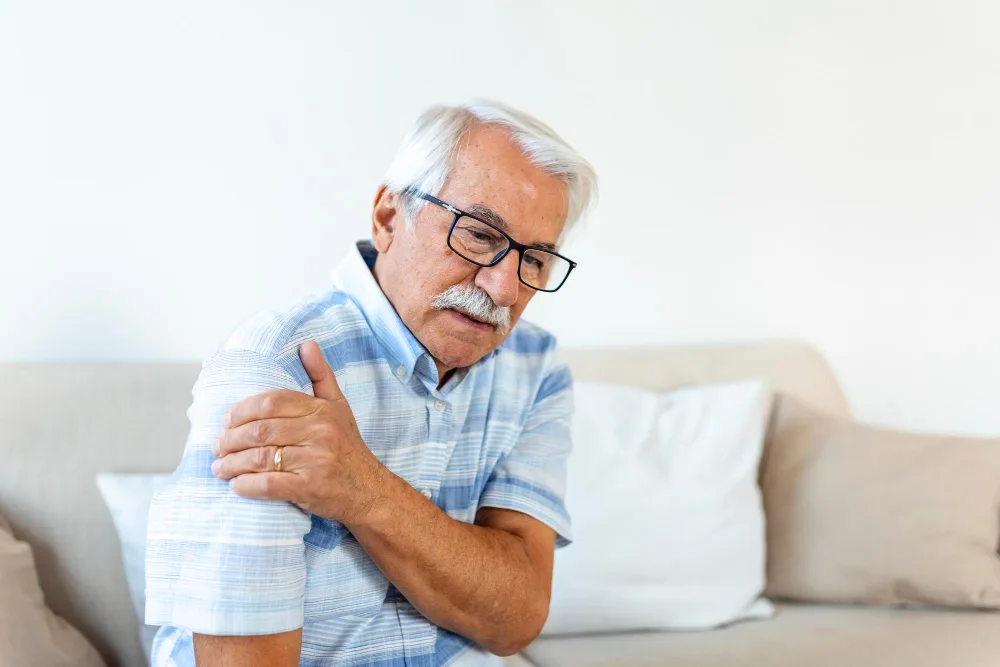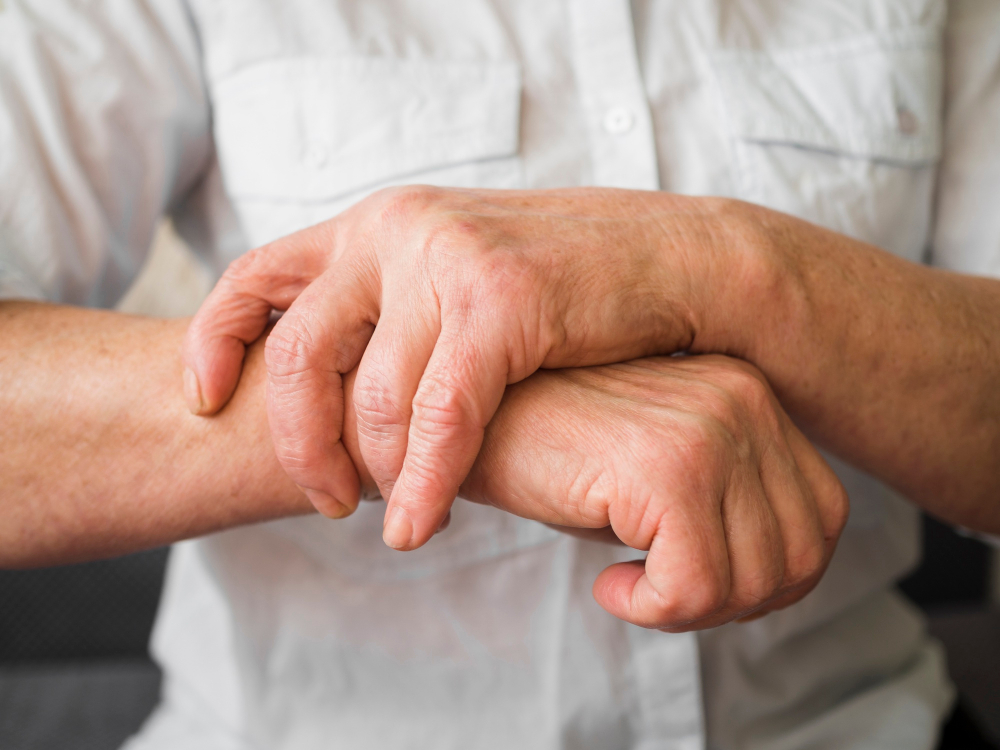How to Cure Rheumatoid Arthritis Permanently?
Category: Orthopedics
Rheumatoid arthritis (RA) is an autoimmune disorder that causes chronic inflammation of the joints, leading to pain, stiffness, and loss of mobility. Unlike temporary joint pain, rheumatoid arthritis symptoms tend to worsen over time if not treated promptly. Many people search for a rheumatoid arthritis cure, hoping to find a permanent solution, but while there’s no absolute cure, modern medicine offers highly effective ways to manage and even reverse its progression.
At Lokmanya Hospitals, one of the leading centers for rheumatoid arthritis treatment in Pune, patients receive advanced, personalized care focused on improving joint health and quality of life. With a team of experienced rheumatoid arthritis specialist doctors in Pune, Lokmanya Hospitals combines medical innovation, accurate diagnosis, and long-term management to help patients regain mobility and lead pain-free lives.
Understanding Rheumatoid Arthritis
Rheumatoid Arthritis (RA) is a chronic autoimmune disorder in which the body’s immune system mistakenly attacks the lining of the joints. This immune response causes persistent inflammation, resulting in pain, swelling, and stiffness, and, over time, can lead to damage of cartilage and bone if left untreated.
Beyond the joints, rheumatoid arthritis can also impact other parts of the body, including the eyes, lungs, and heart, potentially causing complications in severe cases. Early detection and timely rheumatoid arthritis treatment are therefore crucial to manage symptoms, prevent joint damage, and maintain overall health.
Rheumatoid Arthritis Causes
The exact rheumatoid arthritis causes are still not completely understood, but research has identified several key factors that may trigger or contribute to the development of the condition. Understanding these can help in early detection and effective management.
- Genetics: Individuals with a family history of autoimmune diseases are at a higher risk of developing RA. Certain genetic markers can make the immune system more prone to attacking healthy joint tissues, increasing susceptibility to inflammation and joint damage.
- Hormonal Changes: RA is more prevalent in women, suggesting a hormonal link. Fluctuations in estrogen and other hormones can influence immune system activity, potentially triggering autoimmune responses that attack the joints.
- Environmental Triggers: External factors such as smoking, exposure to pollution, or certain infections can activate the immune system abnormally, leading it to attack joint tissues. These triggers can exacerbate inflammation and accelerate disease progression.
- Lifestyle Factors: Diet, stress, and lack of physical activity can worsen inflammation. Poor nutrition may deprive the body of essential anti-inflammatory nutrients, while chronic stress can disrupt immune function. Sedentary habits also contribute to joint stiffness and muscle weakening, increasing the impact of RA.
By identifying and addressing these contributing factors early, patients can reduce the risk of severe progression and improve the effectiveness of rheumatoid arthritis treatment.
Rheumatoid Arthritis Symptoms
- Persistent joint pain, tenderness, and swelling: One of the earliest and most noticeable rheumatoid arthritis symptoms is ongoing pain in the joints, often accompanied by tenderness when touched. The affected areas may swell due to inflammation, making simple movements uncomfortable.
- Stiffness, especially in the morning: Morning stiffness lasting more than 30 minutes is a hallmark of RA. Patients often find it difficult to move joints after waking up, and this stiffness may improve gradually as the day progresses.
- Warmth and redness in the affected joints: Inflamed joints often feel warm to the touch and may appear red. This occurs because the body sends increased blood flow to inflamed areas as part of the immune response, signaling active joint inflammation.
- Fatigue and low energy: Chronic inflammation in RA can cause systemic symptoms like fatigue, low energy, and overall weakness. Even routine activities may feel exhausting, affecting daily life and productivity.
- Loss of joint function in advanced stages: If left untreated, RA can lead to joint damage, deformities, and loss of mobility. Patients may struggle with simple tasks like gripping objects, walking, or climbing stairs, emphasizing the importance of early rheumatoid arthritis treatment.
Rheumatoid Arthritis Diagnosis and Tests
Accurate rheumatoid arthritis diagnosis is key to preventing joint damage. At Lokmanya Hospitals, specialists perform detailed assessments using:
- Rheumatoid Arthritis Test: Blood tests like Rheumatoid Factor (RF), Anti-CCP antibodies, ESR, and CRP.
- Imaging: X-rays, MRI, or ultrasound to detect joint inflammation or erosion.
- Clinical Examination: A thorough physical assessment of joint movement and tenderness.
This combination helps identify the stage of the disease and plan the most effective rheumatoid arthritis treatment strategy.
Stages and Types of Rheumatoid Arthritis
There are four main stages of rheumatoid arthritis:
- Early Stage: Mild stiffness and inflammation.
- Moderate Stage: Increased swelling and restricted motion.
- Severe Stage: Joint damage and cartilage loss.
- End Stage: Joint fusion and limited mobility.
The types of rheumatoid arthritis include:
- Seropositive RA: Patients test positive for RF or Anti-CCP antibodies.
- Seronegative RA: Symptoms exist without these antibodies.
- Juvenile RA: Affects children and adolescents.
Rheumatoid Arthritis Treatment and Medications
At Lokmanya Hospitals, the goal of rheumatoid arthritis treatment is to reduce inflammation, relieve symptoms, and slow disease progression. Common rheumatoid arthritis medications include:
- DMARDs (Disease-Modifying Anti-Rheumatic Drugs): Help prevent joint damage.
- Biologic Agents: Target specific parts of the immune system to control inflammation.
- NSAIDs and Corticosteroids: Provide relief from pain and stiffness.
- Physical Therapy: Strengthens muscles and improves joint flexibility.
The hospital’s multi-disciplinary team ensures each patient receives the best treatment for rheumatoid arthritis, tailored to their unique condition.
Is There a Permanent Cure for Rheumatoid Arthritis?
At present, there is no definitive rheumatoid arthritis cure, as the condition is chronic and varies from person to person. However, with early rheumatoid arthritis diagnosis, appropriate medication, and lifestyle management, patients can achieve significant symptom control and long-term remission.
Lokmanya Hospitals adopts a patient-centered approach, offering advanced rheumatoid arthritis treatment and continuous monitoring to manage the disease effectively. Many patients benefit from reduced pain, improved joint function, and enhanced quality of life, demonstrating that with expert care, RA can be controlled successfully even without a permanent cure.
Why Choose Lokmanya Hospitals for Rheumatoid Arthritis Treatment?
Lokmanya Hospitals is recognized as one of the leading centers for rheumatoid arthritis treatment in Pune, providing comprehensive care under one roof. The hospital’s team of highly skilled rheumatoid arthritis specialist doctors in Pune follows a multidisciplinary approach, combining advanced diagnostics, personalized medication, physiotherapy, and rehabilitation to deliver long-lasting relief.
With cutting-edge technology, patient-focused care, and a proven track record, Lokmanya Hospitals is a preferred choice for individuals seeking specialized treatment for rheumatoid arthritis. The hospital ensures expert care with compassion and precision, helping patients manage their condition effectively and improve their quality of life.
Conclusion
A rheumatoid arthritis cure may not be permanent at this time, but with timely treatment, lifestyle management, and consistent medical guidance, patients can achieve lasting remission and significantly reduce symptoms. Early intervention and personalized care play a crucial role in preserving joint function and maintaining overall health.
Lokmanya Hospitals remains a trusted destination for rheumatoid arthritis treatment in Pune, offering comprehensive care that helps patients regain mobility, confidence, and comfort. Through a combination of advanced therapies, expert guidance, and supportive rehabilitation, patients are empowered to lead active, fulfilling lives despite the challenges of RA.
Frequently Asked Questions
1. Is rheumatoid arthritis curable permanently?
No, rheumatoid arthritis cannot be cured permanently, but it can be controlled effectively with early diagnosis and proper treatment.
2. What are the first signs of rheumatoid arthritis?
Common rheumatoid arthritis symptoms include joint stiffness, swelling, and morning pain lasting over 30 minutes.
3. What is the best test for rheumatoid arthritis diagnosis?
The rheumatoid arthritis test includes Rheumatoid Factor (RF), Anti-CCP antibodies, ESR, and CRP tests.
4. Who is the best doctor for rheumatoid arthritis in Pune?
You can consult Lokmanya Hospitals, which has some of the best rheumatoid arthritis specialist doctors in Pune.
5. What medications are used to treat rheumatoid arthritis?
Rheumatoid arthritis medications include DMARDs, biologics, corticosteroids, and NSAIDs prescribed based on the disease stage.
6. Can diet help in managing rheumatoid arthritis?
Yes, an anti-inflammatory diet rich in omega-3 fatty acids, fruits, and vegetables can help reduce symptoms.
7. What are the stages of rheumatoid arthritis?
There are four stages of rheumatoid arthritis—early, moderate, severe, and end-stage—each requiring specific management.
8. How is rheumatoid arthritis treated at Lokmanya Hospitals?
At Lokmanya Hospitals, treatment includes medical therapy, physiotherapy, and personalized care plans for long-term joint health.
Previous blog

What is Arthritis?
Next blog






